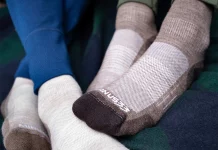If you wake up frequently soaked in sweat, you know how embarrassing that is. But, how can we know if this is a sign of a health problem?
Often the appearance of night sweat is a side effect of high temperature, sleeping with thick pajamas or using blankets that are too hot.
In other cases, night sweat may indicate a major problem. If the situation recurs repeatedly, this could be caused by the following medical conditions:
1. Obstructive sleep apnea
People who suffer from this illness, do not sleep well at night because their respiratory tracts are blocked. This restricts the flow of air, which has the side effect of causing excessive night sweat.
But this is not all, in addition night sweat can appear because of:
- snoring
- Fatigue
- Headache
- Bad mood
If you notice any of these symptoms associated with excess sweating it would be advisable to consult a doctor.
If you are diagnosed with obstructive sleep apnea, you should treat it before it causes major problems like heart disease or diabetes.
The solution in most cases can be the use of a machine that will allow you to breathe during the night so that you can sleep better.
2. Menopause
Menopause make you subject to hormonal ups and downs that cause alterations in your body. These constant fluctuations also mess up in your body temperature.
Women who are in their menopausal often wake up suffocated and very embarrassed because of night sweat. Some get up several times at night and also suffer from other symptoms such as:
- Irregular Menstrual Cycles
- Dry skin
- Bad mood
The average age at which menopause occurs is around the age of 51 years. However, you can start noticing night sweat even a few years before the expected time.
Some women begin to suffer from night sweat from the age of 30.
Menopause is a normal stage in a woman’s life and does not need “remedies.”
Nevertheless, if the symptoms are too troublesome, your family doctor can suggest some treatments that will allow you to be as comfortable as possible.
3. Anxiety

When you suffer from anxiety or chronic stress in the day it can manifest itself by night sweats.
In this case, the solution to the problem may be to better manage the things that cause you anxiety.
It is good to consult a doctor who can help you alleviate the symptoms of anxiety if you really do not know what causes them.
Many specialists practice cognitive behavior therapies. These teach you to adjust your way of thinking. In this way you learn to identify and redirect thoughts that give you anxiety or stress.
However, if the therapy is not sufficient in itself, you can resort to other psychic health professionals. Who can evaluate you and recommend the best treatment to fight the problem.
If you do not want to start with antidepressants and other medications, you can try first with:
- Exercise
- Getting away from any source of negativity
- Balanced diet
You can also read : How To Get Ride Of Neck Wrinkles
4. Certain diseases
You should not automatically assume the worst case if you frequently suffer from night sweat, but it is important to visit your doctor.
Night sweat is often the side effect of a wide variety of diseases, and some can be severe, such as bacterial infections, viral infections up to certain types of cancers.
So when it comes to more complex problems, night sweat is comes with other symptoms.
Only your doctor can rule out any major complications through some exams.
Treatment will vary depending on the condition you are being treated for. In general this can be treated with some antibiotics or by chemotherapy.
5. Low blood sugar levels

Hypoglycemia, also known as low blood sugar, may be the reason people with diabetes often wake up on nights soaked in sweat.
But that’s not all, this problem can cause diabetics to sweat excessively during the day.
Low sugar levels are usually a common side effect when there are problems with insulin or other medications to treat diabetes.
If you are experiencing these problems often, your doctor may advise you on certain changes in your lifestyle so that you avoid the probability of suffering from hypoglycemia.
This may include taking certain meals regularly and making more continuous monitoring of your blood sugar levels.
Night sweat can be unpleasant but you have to remember that it is a sign that your body is sending you to tell you something is going wrong.
Be especially careful if sweating is repeated frequently and if accompanied by other symptoms.
Consulting your doctor can help you discover what the main reason is and place you on the path to the solution to the problem.































